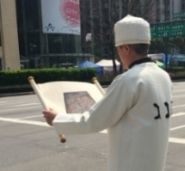| View previous topic :: View next topic |
| Author |
Message |
englishteacher1
Joined: 03 Mar 2008
|
 Posted: Wed Oct 13, 2010 5:35 am Post subject: gyopos or kyopos only Posted: Wed Oct 13, 2010 5:35 am Post subject: gyopos or kyopos only |
 |
|
1. What is a gyopo or kyopo?
a. Born and raised in a foreign country?
b. Born in Korea and raised in a different country at a young age? how young? speaks English fluently, korean not fluent (has Korean citizenship)
c. Mom Korean and Dad foreigner? or vice versa(have a korean face?)
d. Mom Korean and Dad foreigner? or vice versa(have a white face?)
d. just need to have foreign citizenship with a korean face?
e. Born in a foreign country and moved to Korea?
f. Born in Korea and moved to foreign country when 18? Does age matter? speaks Korean fluently, English not fluent( has foreign citizenship)
foreign citizenship can be USA, canada, UK, australia, NZ, etc..
Which ones apply to qualify for a gyopo(kyopo)? Add f.g.h..i...if I missed anything? |
|
| Back to top |
|
 |
sulperman
Joined: 14 Oct 2008
|
|
| Back to top |
|
 |
Died By Bear

Joined: 13 Jul 2010
Location: On the big lake they call Gitche Gumee
|
 Posted: Wed Oct 13, 2010 5:43 am Post subject: Posted: Wed Oct 13, 2010 5:43 am Post subject: |
 |
|
| You may have forgotten Korean adoptees, if we're even regarded as Kyopos at all.. |
|
| Back to top |
|
 |
englishteacher1
Joined: 03 Mar 2008
|
 Posted: Wed Oct 13, 2010 5:45 am Post subject: Posted: Wed Oct 13, 2010 5:45 am Post subject: |
 |
|
The terms dongpo (동포) or gyopo (교포) in Korean refers to any people of ethnic Korean ancestry who live outside Korea.
It says "who live outside of Korea."
SO are you saying all the ethnic Koreans living in Korea today are not Gyopos??
Sometimes wiki don't know s***! |
|
| Back to top |
|
 |
englishteacher1
Joined: 03 Mar 2008
|
 Posted: Wed Oct 13, 2010 5:46 am Post subject: Posted: Wed Oct 13, 2010 5:46 am Post subject: |
 |
|
| Frenetic wrote: |
| You may have forgotten Korean adoptees, if we're even regarded as Kyopos at all.. |
good point!!
are adoptees gyopos kyopos??? |
|
| Back to top |
|
 |
Bibbitybop

Joined: 22 Feb 2006
Location: Seoul
|
 Posted: Wed Oct 13, 2010 7:32 am Post subject: Posted: Wed Oct 13, 2010 7:32 am Post subject: |
 |
|
| Another feather is the inability to use drugs, have AIDS, or have a criminal record. |
|
| Back to top |
|
 |
jvalmer

Joined: 06 Jun 2003
|
 Posted: Wed Oct 13, 2010 8:26 am Post subject: Re: gyopos or kyopos only Posted: Wed Oct 13, 2010 8:26 am Post subject: Re: gyopos or kyopos only |
 |
|
| englishteacher1 wrote: |
1. What is a gyopo or kyopo?
a. Born and raised in a foreign country?
b. Born in Korea and raised in a different country at a young age? how young? speaks English fluently, korean not fluent (has Korean citizenship)
c. Mom Korean and Dad foreigner? or vice versa(have a korean face?)
d. Mom Korean and Dad foreigner? or vice versa(have a white face?)
d. just need to have foreign citizenship with a korean face?
e. Born in a foreign country and moved to Korea?
f. Born in Korea and moved to foreign country when 18? Does age matter? speaks Korean fluently, English not fluent( has foreign citizenship)
foreign citizenship can be USA, canada, UK, australia, NZ, etc..
Which ones apply to qualify for a gyopo(kyopo)? Add f.g.h..i...if I missed anything? |
Colloquially it is an ethnic Korean who has spent most, or all, of their formative years outside of Korea.
So yes, gyopo also includes adoptees. Half Koreans are in a grey zone, if they look Korean then people will refer to them as gyopos.
Someone who grew up in Korea and well into adulthood will not be referred to as a gyopo. So a gyopo's Korean born parents are not gyopos.
Strictly speaking, in the strictest dictionary term, I believe a gyopo requires having Korean citizenship and dongpo is the proper term. So colloquially kyopo is not used in it's original meaning. Dongpo means all ethnic Koreans though. However dongpo is used mostly in NK and thus has communist associations and avoided in SK. |
|
| Back to top |
|
 |
schlotzy
Joined: 10 Mar 2010
Location: South Korea
|
 Posted: Wed Oct 13, 2010 5:49 pm Post subject: Posted: Wed Oct 13, 2010 5:49 pm Post subject: |
 |
|
| I asked this question to my co-teachers recently. They thought of it as Koreans who had spent a large portion of their lives outside of Korea, but were born here in the ROK. However, this doesn't include adoptees. Apparently they are just considered American/Canadian/etc. according to her. They have to have a "significant Korean background". It also doesn't generally include mixed children. Finally, they said it CAN sometimes include 2nd generation immigrants (which seems kind of the opposite of what she said above). |
|
| Back to top |
|
 |
|

